
In the sprawling digital landscape of Codegard, where the ancient and modern constructs of programming intertwine, there lies a challenge as daunting as it is pervasive—the task of "Restoring Shoddy .ddl References." This arcane endeavor, known to induce both awe and despair in the hearts of those who undertake it, is a rite of passage for many who navigate the complex inheritance hierarchies and legacy systems of this realm.
Central to our story is Rowan, a seasoned architect of code, whose journey through the annals of C++ has been marked by battles with both brilliant algorithms and bewildering anti-patterns. Rowan, like many before them, inherits a legacy of code—a tapestry of brilliance interwoven with threads of decisions past, decisions that now manifest as shoddy .ddl references, remnants of a bygone era of programming.
The headline that haunts Rowan's quest, "Inheritance isn't always a good thing," serves as a grim reminder of the double-edged sword of object-oriented programming. For while inheritance promises the elegance of reuse and the efficiency of polymorphism, it also bears the risk of entangling the future with the past, chaining the present to decisions whose contexts have long since faded.
Armed with a deep understanding of C++ and a resolve as unyielding as the code itself, Rowan embarks on the Herculean task of restoration. Each .ddl reference stands as a guardian of legacy, a puzzle that demands both respect for the original architecture and the courage to reimagine it for the modern era.
Rowan's journey is fraught with challenges. The shoddy .ddl references, a labyrinth of dependencies and outdated links, resist initial attempts at restoration. The code, a living history of Codegard's evolution, whispers secrets in the syntax of a bygone era, demanding a translator fluent in both past and present dialects.
With each reference restored, Rowan peels back layers of code, revealing the architecture beneath—the logic and structure that once propelled Codegard into the future. The task requires a delicate balance, a dance between preserving the integrity of the original design and infusing it with the innovations of contemporary practice.
The endeavor is a testament to the tenacity and ingenuity of those who dare to confront the legacies of code. It underscores the timeless truth that in the realm of software development, inheritance, though a powerful tool, is not without its pitfalls. The process of restoring shoddy .ddl references becomes a metaphor for the larger journey of development, a cycle of learning, adapting, and evolving.
"Inheritance isn't always a good thing," thus transcends its warning to become a mantra of mindfulness—a call to approach the inheritance of code with the same reverence and caution as one would the inheritance of power. It serves as a reminder that the structures we build today become the legacies of tomorrow, and in the hands of architects like Rowan, even the most daunting of challenges can be transformed into opportunities for growth and innovation.
And so, in the annals of Codegard, the tale of "Restoring Shoddy .ddl References" stands as a parable of perseverance, a chronicle of the journey from inheritance to innovation, and a testament to the enduring spirit of developers who, in the face of legacy and limitation, continue to push the boundaries of what is possible in the ever-evolving landscape of code.